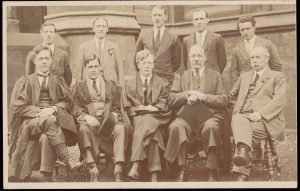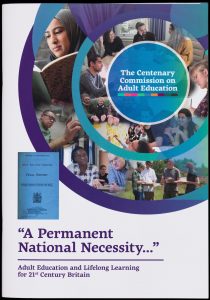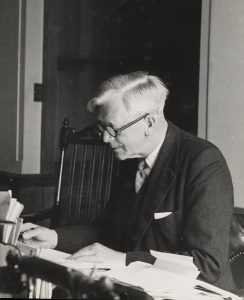October 21, 2022, by Kathryn Steenson
One hundred years on: New types of University and new possibilities for lifelong education?
This is a guest post by Dr Iain Jones, Honorary Assistant Professor at University of Nottingham.
From 27 October 2022 – 12 March 2023, Lakeside Arts is hosting an exhibition ‘Knowledge is Power: Class, Community, and Adult Education’ and a series of lunchtime talks. The University established the first Department of Adult Education in 1920 and, in 1922, Robert Peers was appointed its first Chair. Peers is featured in the exhibition and is the subject of one of the talks by Professor Cilla Ross, ‘Workers’ Education and the Co-operative Spirit’, on February 14th. Here, Dr Iain Jones, reflects on Peers and why a lecture he gave in 1922 offers a glimpse into contemporary debates about universities and adult lifelong education.
The University holds Robert Peers’ papers in its archive. The seven boxes are a record, celebration and examination of his work – and one account of the University’s contributions to the development of different forms of adult education. Peers’ handwritten lecture notes, and other correspondence, highlight his formative ideas and justification for how this work took shape. Why do they matter today?

Photograph of Robert Peers (seated, centre) with fellow lecturers at University College, Nottingham, c. 1922 (Pe Ph 1/15)
They emphasise the values of lifelong adult education (reflected in the final report of the 1919 Ministry of Reconstruction Adult Education Committee) compared with restricted contemporary policies on lifelong learning (see, for example, the latest Government consultation, on funding and further education that ended in October 2022– with its narrow emphasis on skills and impact on community education). Examining these traditions and tensions enriches debates about the contemporary places of universities and their work in diverse communities. Peers would recognise these debates – and the possibilities they offer.
A university of the future? For life in the fullest and widest sense
On 28 June 1922, Peers gave an ‘Address to Students UCN’(University College Nottingham). In handwritten lecture notes, his vision was clear:
Univ. of future will be largely concerned with adult educ, – in other words, with educ. not as process of training for a profession, affecting young men and women before they go out into world; but as a lifelong process. A training for life in fullest and widest sense.[1]
That purpose had implications for the identities of a University – and a sense of vocation for those who worked there. It still has a contemporary resonance. For Peers, there was a need for ‘a new type of University’ and what he saw as ‘an increasing demand for people who have passed thro’ University to undertake this great work of fitting University to needs of a new age’[2]
Looking back and forwards
Peers asked these questions 100 years ago. They also offer a starting point for contemporary debates about the place of a University and different forms of higher education. The Centenary Commission on Adult Education, formed in 2018, and co-chaired by The University of Nottingham and University of Oxford, produced a final report ‘A Permanent National Necessity ‘: Adult Education and Lifelong Learning for 21st Century Britain (2019). A series of further events disseminated the report in 2020 and, that Autumn, a research circle grew out of one of these events.

Centenary Commission on Adult Education (2019), “A Permanent National Necessity…”: Adult Education and Lifelong Learning for 21st Century Britain. Cover. From ACC 3209.
Since Spring 2021, the research circle on ‘Building community, democracy and dialogue through adult lifelong education’, jointly convened with Dr Sharon Clancy, School of Education, has organised two series of events to challenge dominant perspectives on lifelong learning. In 2021, three events took inspiration from speakers and participants from a wide range of voluntary and community organisations and adult, further and higher education. They asked
- Why does adult lifelong education need to be radically reshaped, especially in the Covid era, and how?
- How does adult education link with and foster our democracy?
In 2022, three further events on health, the environment, and the place of universities and their relationship to participatory action and social movements were held. Each emphasised the central importance of our shared histories, memories, and managing previous struggles between the possibilities of lifelong education and dominant and restricted visions of lifelong learning. We hope Peers would recognise our spirit of enquiry, and our work within and outside of higher education, as we contribute to re-imagining lifelong learning and the possibilities of lifelong education – in the fullest and widest sense.
References
- Centenary Commission on Adult Education. (2019), ‘A Permanent National Necessity’: Adult Education and Lifelong Learning for 21st Century Britain. Nottingham: University of Nottingham.
- Department for Education. (2022), Implementing a new FE funding and accountability system. (Accessed: 10 October, 2022).
- Ministry of Reconstruction Adult Education Committee. (1919), Final Report Volume 321 of Cmd. (Great Britain. Parliament) H. M. Stationery Office, London
Dr Iain Jones, an Honorary Assistant Professor in the School of Education, jointly convenes a research circle on ‘Building community, democracy and dialogue through adult lifelong education’, with Dr Sharon Clancy, Assistant Professor in the School of Education, University of Nottingham who established the circle in September 2020.
[1] Original punctuation retained
[2] Original punctuation retained
No comments yet, fill out a comment to be the first


Leave a Reply